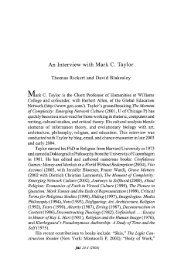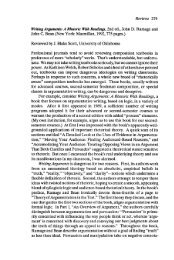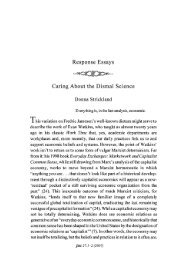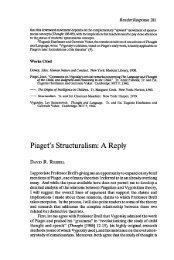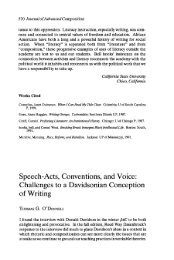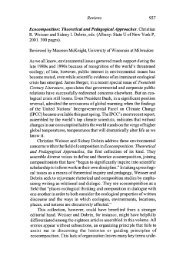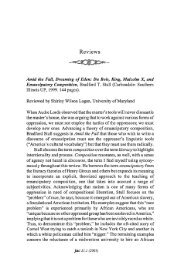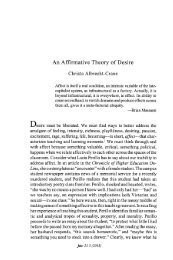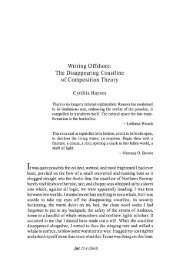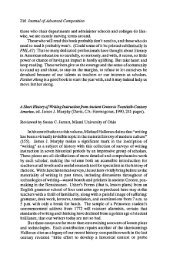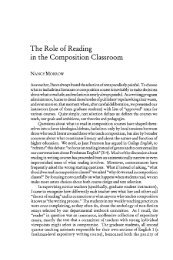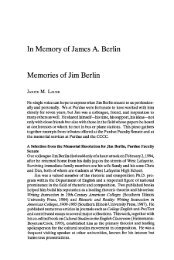Politics, Pedagogy, and the Profession of Composition ... - JAC Online
Politics, Pedagogy, and the Profession of Composition ... - JAC Online
Politics, Pedagogy, and the Profession of Composition ... - JAC Online
You also want an ePaper? Increase the reach of your titles
YUMPU automatically turns print PDFs into web optimized ePapers that Google loves.
Bruce Horner 131<br />
"emancipatory authority" <strong>of</strong> <strong>the</strong> critical teacher because, following her<br />
logic, any exercise <strong>of</strong> "authority" is complicit with "authoritarianism"<br />
<strong>and</strong> so cannot be emancipatory (307). Indeed, she rejects <strong>the</strong> possibility<br />
<strong>of</strong> any ethical exercise <strong>of</strong> teacherly authority altoge<strong>the</strong>r: how, she asks<br />
rhetorically, "does a teacher 'make' students autonomous without directing<br />
<strong>the</strong>m?" (308). In such statements, Ellsworth implies that since by<br />
definition any actual use <strong>of</strong> authority is problematic, all exercise <strong>of</strong><br />
authority must be ruled out. The problem <strong>of</strong> authority is grounds for its<br />
rejection (see also McLaren 71-72).<br />
Much <strong>of</strong> <strong>the</strong> criticism <strong>of</strong> Ellsworth 's view has focused on her limited<br />
conception <strong>of</strong> possible or actual power relations between teachers <strong>and</strong><br />
students in <strong>the</strong>ir institutional roles as teachers <strong>and</strong> students. That criticism<br />
insists on a more differentiated or relational view <strong>of</strong> power that would<br />
grant, or acknowledge, a degree <strong>of</strong> agency to students <strong>and</strong> qualify <strong>the</strong><br />
totalized underst<strong>and</strong>ing <strong>of</strong> <strong>the</strong> effect <strong>of</strong> power that Ellsworth seems to<br />
fear. While such criticisms complicate <strong>the</strong> picture <strong>of</strong> politics operating<br />
within <strong>the</strong> classroom, <strong>the</strong>y typically do not address <strong>the</strong> relation <strong>of</strong> such<br />
politics to <strong>the</strong> larger material circumstances in which such politics take place.<br />
For example, Patricia Bizzell argues that teachers need to differentiate<br />
among <strong>the</strong> ways <strong>the</strong>y can exercise power. Bizzell identifies Ellsworth's<br />
experience as exemplary <strong>of</strong> <strong>the</strong> impasse created by teachers such as<br />
herself who "want to serve <strong>the</strong> common good with <strong>the</strong> power we possess<br />
by virtue <strong>of</strong> our position as teachers" but who none<strong>the</strong>less remain "deeply<br />
suspicious <strong>of</strong> any exercise <strong>of</strong> power in <strong>the</strong> classroom" (54). To break<br />
through this impasse, Bizzell argues, we need a more differentiated notion<br />
<strong>of</strong> power (54-55).<br />
Bizzell herself differentiates three types <strong>of</strong> power: "coercion," "persuasion,"<br />
<strong>and</strong> "authority" ("Power" 56-57). While coercion involves A's<br />
exercise <strong>of</strong> power over B without <strong>the</strong> consent <strong>of</strong> B, persuasion is <strong>the</strong><br />
exercise <strong>of</strong> power only with both parties' consent <strong>and</strong> only in ways that<br />
change both. For Bizzell, persuasion represents <strong>the</strong> kind <strong>of</strong> power ideally<br />
exercised in dialogic or collaborative, non-hierarchical teaching. Authority,<br />
in contrast, is exercised when A acts instrumentally over B without<br />
having to persuade B that <strong>the</strong> actions will serve B' s interests; no "persuasion"<br />
is required. However, authority differs from coercion in that B must<br />
first grant A <strong>the</strong> right to exercise such power over B by being persuaded<br />
that this will be in B's best interests. Thus, in this third type <strong>of</strong> power,<br />
"once B has been persuaded to grant authority to A, <strong>the</strong>ir relationship<br />
changes to a less dialogic one. B empowers A to direct <strong>the</strong>ir course <strong>of</strong><br />
action without A's having to exercise persuasion at every step taken" (57).



